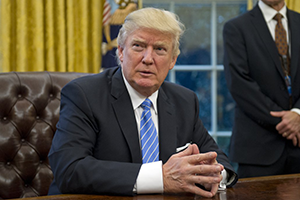Putting President Trump in the Trump Budget
Originally published at Fox News.

Office of Management and Budget Director Mick Mulvaney faces a unique challenge. He must build a federal budget that accounts for President Donald Trump’s focus on frugality, deregulation and his extraordinary bargaining ability – a challenge to the traditional budget scoring process.
The traditional process anticipates and accounts for red tape and typical procurement policies. So any proposed budget based on the bureaucratic system will inevitably be far more expensive than a budget driven by President Trump's entrepreneurial drive and frugality.
The latest economic outlook from the Office of Management and Budget (OMB) estimated the federal budget deficit in the 2016 budget year was $544 billion. This represents a public debt of 76 percent of the gross domestic product. By 2026, this figure is expected to exceed 86 percent – assuming nothing changes in Washington. However, something has changed in Washington – the arrival of President Trump.
Director Mulvaney has the great challenge of calculating how much the President’s entrepreneurial skills will significantly lower costs and reverse projected trends over the next decade.
If Mulvaney and his team successfully create a Trumpian budget, the administration can potentially save a tremendous amount of money.
Look at federal construction alone. President Trump's entire career was based on successful construction with great buildings delivered at or below budget and ahead of schedule.
Applying Trumpian principles to the hundreds of billions of dollars worth of federal construction planned over the next decade could be a huge opportunity for a less expensive federal budget.
President Trump’s skills could help save tens of billions of dollars on a long list of federal projects including buildings, roads, bridges, locks, dams, and other major infrastructure projects across the country.
Take the Wollman Rink example from President Trump’s book The Art of the Deal. The City of New York had spent six years and $15 million trying to repair the Wollman Rink. Trump, who could see the defunct rink from his home in Trump Tower, finally got fed up and offered to take over the repairs. He was able to fully repair the rink in less than four months for less than $2.5 million. He even had time and money left over to renovate the adjacent restaurant and skate house.
Or take a more recent project, Trump International, built in the Old Post Office Building in Washington, D.C. This project opened in October 2016, but its final contracted completion date with the General Services Administration was actually August 2018.
The Wollman Rink was fixed for one-sixth of the cost in one-eighteenth of the time New York City had spent failing. President Trump’s team should apply the Wollman Rink model to every major construction project it undertakes – such as the wall on the Mexican border – and the $1 trillion-worth of infrastructure President Trump wants to build.
Further, if Director Mulvaney can work with Congress to identify and change laws that currently push projects over schedule, force bureaucrats to make poor decisions, and drive up costs, the long-term price tag for federal construction can be reduced even further. President Trump can save tens of billions of dollars in the direct federal construction budget and hundreds of billions of dollars on federal contracting and funding over the next decade.
President Trump should also continue to determine what current contracts and programs need to be renegotiated. For instance, all construction contracts with costs that exceed $100 million should be reviewed as soon as possible, and renegotiations or cancellations should be ordered wherever possible. He has already begun renegotiating major contracts with Boeing and Lockheed Martin with positive results. President Trump was able to shave $600 million off the disastrous F-35 fighter jet program and has extracted assurances from Boeing that the price tag for two Air Force One replacements will not exceed $4 billion. With contracts as large as these, even a savings of 6 percent can keep billions of tax dollars in the federal coffers.
But renegotiation isn’t enough. President Trump should make sure all federal contracts are rigorously enforced – just as he did with the Wollman Rink and other Trump developments.
The administration should also introduce the same type of sound data systems that protect private sector companies from fraud into frequently abused federal programs such as Medicaid, Medicare, and Social Security. If the administration applied these same anti-fraud systems to federally funded healthcare, food stamp and disability benefits, and other programs, it could save taxpayers $120 billion to $160 billion a year – well over a trillion dollars a decade.
This first Trumpian budget shouldn't just be frugal. It should be relentlessly innovative in applying the principles the President has developed throughout his long and impressive career.
Your Friend,
Newt